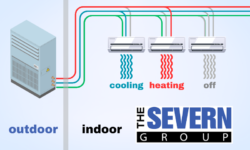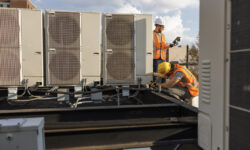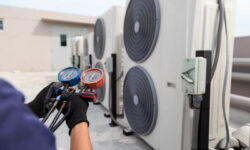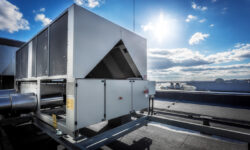Mastering comfort and efficiency with zoned HVAC systems for multi-tenant commercial buildings can be a challenge but one with considerable benefit. In the ever-evolving commercial real estate landscape, property managers and building owners are constantly seeking ways to enhance tenant satisfaction, reduce energy costs, and improve overall building performance. One innovative solution that checks all these boxes is the implementation of Zoned HVAC Systems. The Severn Group will explore the benefits and considerations of using Zoned HVAC Systems in multi-tenant commercial buildings.
Read more →Heating, ventilation, and air conditioning (HVAC) systems are essential for maintaining comfort in buildings, whether they are residential, commercial, or industrial. However, they can also be one of the largest energy consumers in these structures. As a result, the quest for more energy-efficient HVAC solutions has led to the development of Variable Refrigerant Flow (VRF) HVAC systems. This blog post will explore how VRF HVAC systems work and how they maximize energy efficiency to reduce operational costs.
Read more →The Severn Group has narrowed the list to 4 important HVAC task lists for facility managers that are crucial to the upkeep of your facility. As a facility manager your primary role is to ensure that the facility operates smoothly, efficiently, and safely, providing a comfortable and functional environment for its occupants. Read on to learn about 4 essential regular maintenance tasks and inspections that will maximize energy efficiency, prevent costly repairs, and extend the lifespan of your HVAC systems.
Read more →In today’s competitive business landscape, companies often seek reliable partners to meet their diverse needs and ensure smooth operations. The Severn Group has emerged as a trusted and preferred choice for numerous organizations regarding facility management, building services, and energy solutions. Read on to explore our services and see why companies choose us as their service provider.
Read more →An HVAC retrofit refers to upgrading or replacing an existing heating, ventilation, and air conditioning system in a building with newer and more efficient technology. Read on to learn more about evaluating your current HVAC system, determining the needs of your building, and how we can help with installing or upgrading your HVAC system components to best meet those needs.
Read more →Regular HVAC maintenance allows you and your occupants to trust that you will be comfortable year-round. Suppose your system wants to create and deliver warm or cool air more consistently and gradually. Regular HVAC maintenance reduces the odds that you’ll come to work one winter’s day to find frigid air blasting through your vents. Read on to learn how investment into regular HVAC maintenance is relatively low cost vs the price of a single repair or loss of production due to stoppage and can greatly increase early issue detection as well as efficient systems operations.
Read more →The United States Department of Energy has a multitude of different responsibilities, but the organization’s primary responsibilities involve managing the nation’s nuclear infrastructure. As ONE of its many responsibilities, the DOE also creates efficiency standards for HVAC equipment. The newest set of standards, 2023 DOE Efficiency Standards, become effective January 1, 2023. These 2023 DOE Efficiency Standards are based on research conducted by independent entities. The DOE and other organizations provide these researchers with funding so that they can explore ways to optimize energy consumption. DOE standards primarily apply to HVAC equipment manufacturers and installers. However, they can also impact your business in several ways. By voluntarily adhering to these standards, you can save money and improve energy efficiency. Additionally, you may be able to access tax credits by designing a system that complies with 2023 standards. Join us as we examine the latest set of 2023 DOE standards and what they mean for your business.
Read more →Your building’s HVAC system and its energy use represent a significant cost to your business. If your system wastes energy, that’s money down the drain. The International Energy Agency says that AC alone accounts for 20% of electricity use in buildings today and that we need to improve that value in the future. There are many potential causes of energy inefficiency in HVAC systems. You can watch for these signs to determine whether your HVAC system is wasting energy and take action to improve it.
Read more →Keeping your commercial HVAC system in working order provides a wide range of benefits. The Department of Energy highlights the need for a proper HVAC system to conserve energy and ensure air quality. You can watch for these signs to tell when you’re dealing with a failing HVAC system.
Read more →As a commercial HVAC contractor, we focus solely on servicing the heating and cooling systems for businesses and industrial businesses. This allows us to ensure each of our technicians has the specialized experience and skills necessary to work with larger cooling systems. Read on to discover some of the reasons we focus on commercial HVAC equipment.
Read more →









